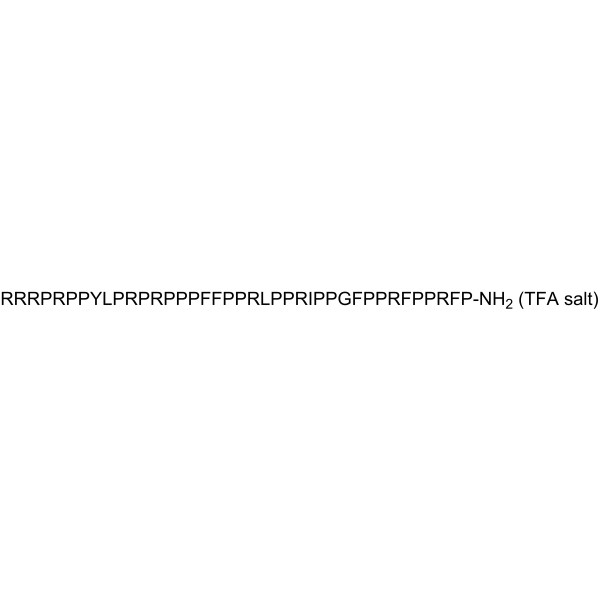PR-39 TFA |
| Catalog No.GC63964 |
PR-39 TFA, a natural proline- and arginine-rich antibacterial peptide, is a noncompetitive, reversible and allosteric proteasome inhibitor.
Products are for research use only. Not for human use. We do not sell to patients.

Sample solution is provided at 25 µL, 10mM.
PR-39 TFA, a natural proline- and arginine-rich antibacterial peptide, is a noncompetitive, reversible and allosteric proteasome inhibitor. PR-39 TFAreversibly binds to the α7 subunit of the proteasome and blocks degradation of NF-κB inhibitor IκBα by the ubiquitin-proteasome pathway. PR-39 TFA stimulates angiogenesis, inhibits inflammatory responses and significant reduces myocardial infarct size in mice[1][2].
PR-39 TFA, shown to selectively affect proteasomemediated protein degradation in vivo, alters the shape of the 20S and 26S cylinder and affects the binding of 19S caps in a reversible manner. PR-39 TFA specifically blocks degradation of IκBα and HIF-1α by the proteasome[1]. PR-39 TFA (100 nM) blocks TNF-α-induced (1 ng/mL; for 20 minutes) activation of VCAM-1 (2 hours) and ICAM-1 (8 hours) expression in human umbilical vein endothelial cells (HUVEC)[2]. PR-39 TFA (10 μM) does not affect the ability to proliferate of ECV304 cell. PR39 is able to inhibit IκBα degradation without significantly affecting overall protein degradation in cells[2].
PR-39 TFA (10 mg/kg, intravenously; 1 hour before Caerulein of 50 μg/kg, ip) blocks IκBα degradation and NF-κB-dependent transcription in the mouse pancreas after induction of acute pancreatitis[2]. PR-39 TFA (1 μg/kg/day; 7-day intraperitoneal infusion) demonstrates significantly small infarct in C57BL/6 mice[2].
[1]. Maria Gaczynska, et al. Proline- and arginine-rich peptides constitute a novel class of allosteric inhibitors of proteasome activity. Biochemistry. 2003 Jul 29;42(29):8663-70.
[2]. Y Gao, et al. Inhibition of ubiquitin-proteasome pathway-mediated I kappa B alpha degradation by a naturally occurring antibacterial peptide. J Clin Invest. 2000 Aug;106(3):439-48.
Average Rating: 5 (Based on Reviews and 40 reference(s) in Google Scholar.)
GLPBIO products are for RESEARCH USE ONLY. Please make sure your review or question is research based.
Required fields are marked with *




















